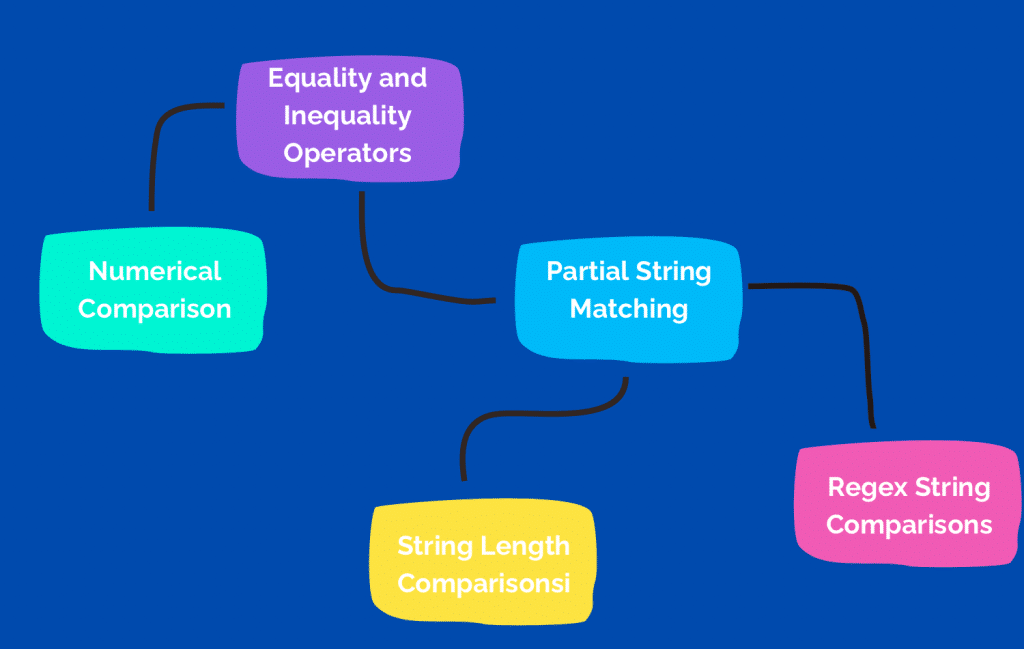
While writing Bash scripts, we will often require Bash string comparison to evaluate if two strings are equal or not. The two strings are equal when they have the same length and contain the same sequence of characters.
In this article, we’ll look at some of the techniques to compare bash strings and explore several methods that can use to evaluate if two strings are equal. We’ll explain each technique with proper that will provide you a better understanding and a solid foundation for the future Bash scripting tasks. Now let’s dig in to the article.
What is Bash String?
Bash String is the type of data that is similar to boolean or integer. It is usually used to represent the text. It is the string of characters which might also contain numbers enclosed within single or double quotes.
Comparing The Bash Strings: All the Techniques
1. Equality and Inequality Operators
The most common way to perform bash string comparison is to check whether they are the same or not. This can be done by using double equal signs (==) for equality and for the “not equal” operator use the combination (!=).
Here are examples of each:
if [ "perimattic1" == "perimattic2" ]; then echo "Equal"; fi if [ "perimattic1" != "perimattic2" ]; then echo "Not equal"; fi
In the above code we have compared variables as perimattic1 and perimattic2.
The equality and inequality operators are much easier to understand, and the ones you will be using a lot in bash string when checking roles or permissions.
2. Numerical Comparison
If you have two numbers in bash, stored in variables, and want to check which one is greater than then you have to use something known as “numerical comparison”, that is very different from what you have been using to in other languages that treat variables differently depending on how they are declared.
For numerical comparisons, bash has the following operators:
- eq – equality
- lt – inequality
- le – lesser than or equal
- gt – greater than
- ge – greater than or equal
- ne – not equal
Here’s a example of using the “lesser than” operator:
c="10"
d="20"
if [ "$c" -lt "$d" ]; then
echo "$c is less than $d”
fiIn this example, the two variables $a and $b are numbers. However, they’re represented by strings internally, so when we want to check if one is lesser than the other, we use the “lt” numerical operator.
To use the numerical operators, you must use them with a dash (-) as shown in the examples above. They are not as intuitive to write as regular comparison operators in other languages. However, because bash treats all variables as strings, we have no choice left but to use these slightly unintuitive operators for numerical comparisons.
3. Partial String Matching
Bash string comparison for partial string matching can be achieved using various methods such as pattern matching with wildcards, substring extraction, or regular expressions. Here are some examples:

1. Pattern Matching with Wildcards:
string="HelloWorld" # Check if the string contains "Hello" anywhere in it if [[ "$string" == *"Hello"* ]]; then echo "Partial match found: Hello" else echo "No partial match for: Hello" fi
2. Substring Extraction:
string=”HelloWorld”
# Extract a substring and check if it matches
substring=”World”
if [[ “$string” == *”$substring”* ]]; then
echo “Partial match found: $substring”
else
echo “No partial match for: $substring”
fi
3. Regular Expressions:
string="HelloWorld" # Use regular expressions to check for a partial match if [[ "$string" =~ "Hello" ]]; then echo "Partial match found: Hello" else echo "No partial match for: Hello" fi
4. Regex String Comparisons
Bash string permits you to compare it to regular expressions. For example:
if [[ "$str" =~ ^[a-zA-Z]+$ ]]; then echo "str is alphabetic"; fi
In the above example, “$str” with a regular expression that checks to see if the string is alphabetic. Since regexes use square brackets for their expressions, the matching needs you to use double square brackets [[ ]] for partial string matching.
5. String Length Comparisons
Instead of comparing the contents of two strings, you can also compare their length by using the hash (#) operator and can compare lengths by utilizing the numerical comparison.
Bash Strings Compare: How to Check if Two Strings Are Equal with Example
Create a Script File
The first step to check if two strings are equal by creating a script file.
#!/bin/bash string1="perimattic" string2="company" if [[ "$string1" == "$string2" ]]; then echo "Strings are equal" else echo "Strings are not equal" fi
Now that we have our script file ready, let’s now move on to the next step where we will try the several techniques to check if the two strings are equal.
Technique1: Check if Two Strings Are Equal with the test Command
The test command is the built-in shell command that is utilized to evaluate conditional expressions. It has the following syntax:
test expression
Let’s now write a script using the testcommand to check if two strings are equal. Here’s the script:
#!/bin/bash string1="perimattic" string2="perimattic" if test "$string1" = "$string2"; then echo "Strings are equal" else echo "Strings are not equal" fi
In this script:
– We assign the strings “perimattic” and “perimattic” to the variables `string1` and `string2`, respectively.
– Then, we use the `test` command with the equal (`=`) operator to compare the two strings.
– If the strings are equal, the script prints “Strings are equal”; otherwise, it prints “Strings are not equal”.
Technique 2: Check if Two Strings Are Equal with the [ Command
Here’s the script to check if two strings are equal with the [ command:
#!/bin/bash string1="perimattic" string2="perimattic" if [ "$string1" = "$string2" ]; then echo "Strings are equal" else echo "Strings are not equal" fi
In this script:
– We assign the strings “perimattic” and “perimattic” to the variables `string1` and `string2`, respectively.
– Then, we use the `[` command with the equal (`=`) operator to compare the two strings.
– If the strings are equal, the script prints “Strings are equal”; otherwise, it prints “Strings are not equal”.
Technique 3 : Check if Two Strings Are Equal Using the [[ Keyword
Here’s the script to check if two strings are equal with the [[ keyword:
#!/bin/bash string1="perimattic" string2="perimattic" if [[ "$string1" == "$string2" ]]; then echo "Strings are equal" else echo "Strings are not equal" fi
In this script:
– We assign the strings “perimattic” and “perimattic” to the variables `string1` and `string2`, respectively.
– Then, we use the `[[` keyword with the equal (`==`) operator to compare the two strings.
– If the strings are equal, the script prints “Strings are equal”; otherwise, it prints “Strings are not equal”.
The `[[` keyword provides more features and flexibility for conditional expressions compared to the single `[` command.
Technique4: Check if Two Strings Are Equal in One Line
[[ "$string1" == "$string2" ]] && echo "Strings are equal" || echo "Strings are not equal"
This command uses the `[[` keyword with the equal (`==`) operator to compare the two strings.
If the strings are equal, it prints “Strings are equal”; otherwise, it prints “Strings are not equal”.
The `&&` operator is used for conditional execution. If the condition (`”$string1″ == “$string2″`) is true, the first command (`echo “Strings are equal”`) is executed. Otherwise, the second command (`echo “Strings are not equal”`) is executed.
Conclusion
In conclusion, in this article, we have explored different Bash string comparison techniques and how to check if two strings are equal. We have used the test and [ commands, as well as the [[ keyword. We also explored how to perform these equality string comparisons in a single line using the logical && and || operators.

